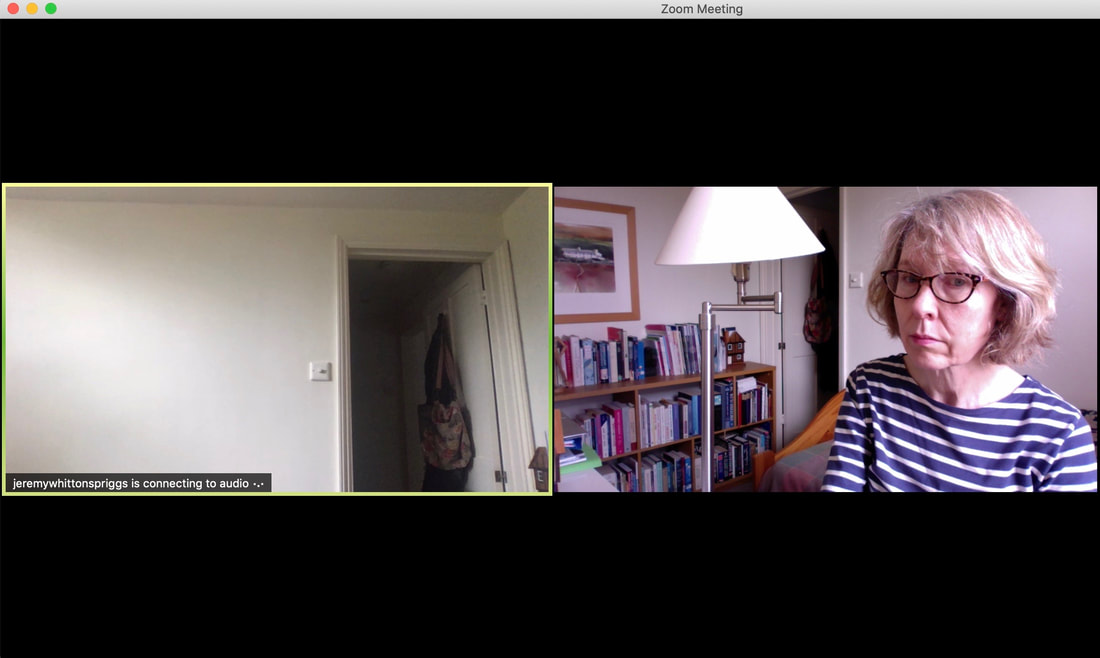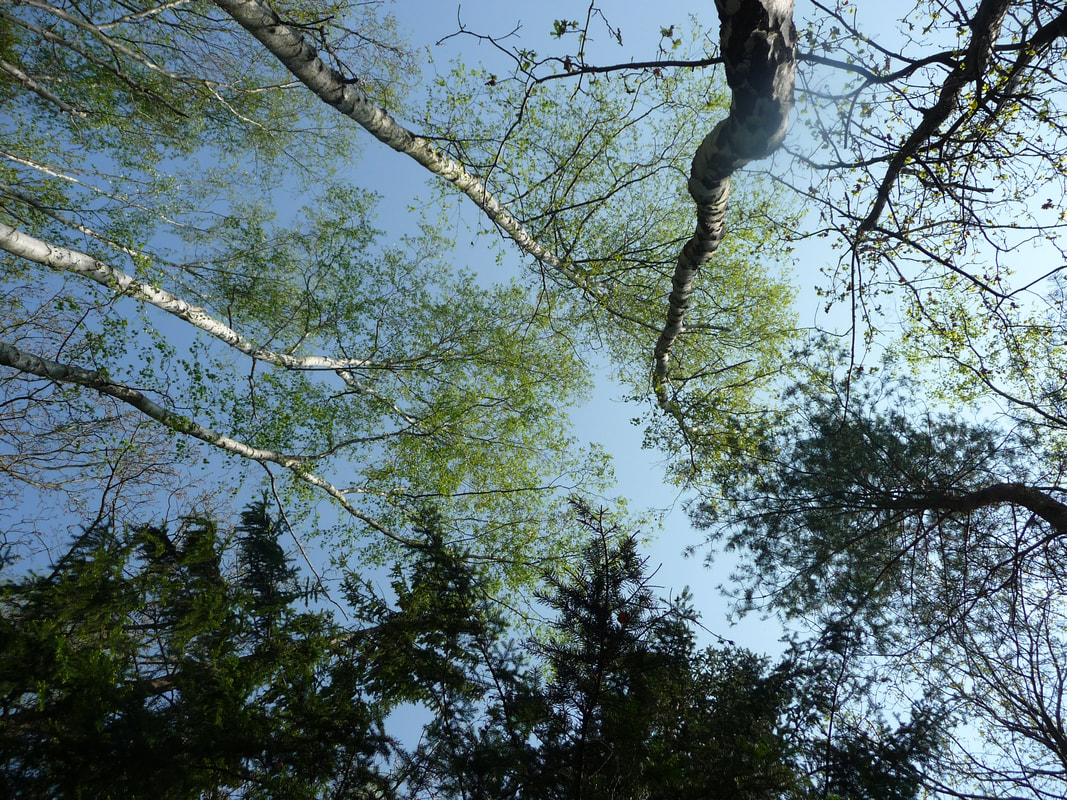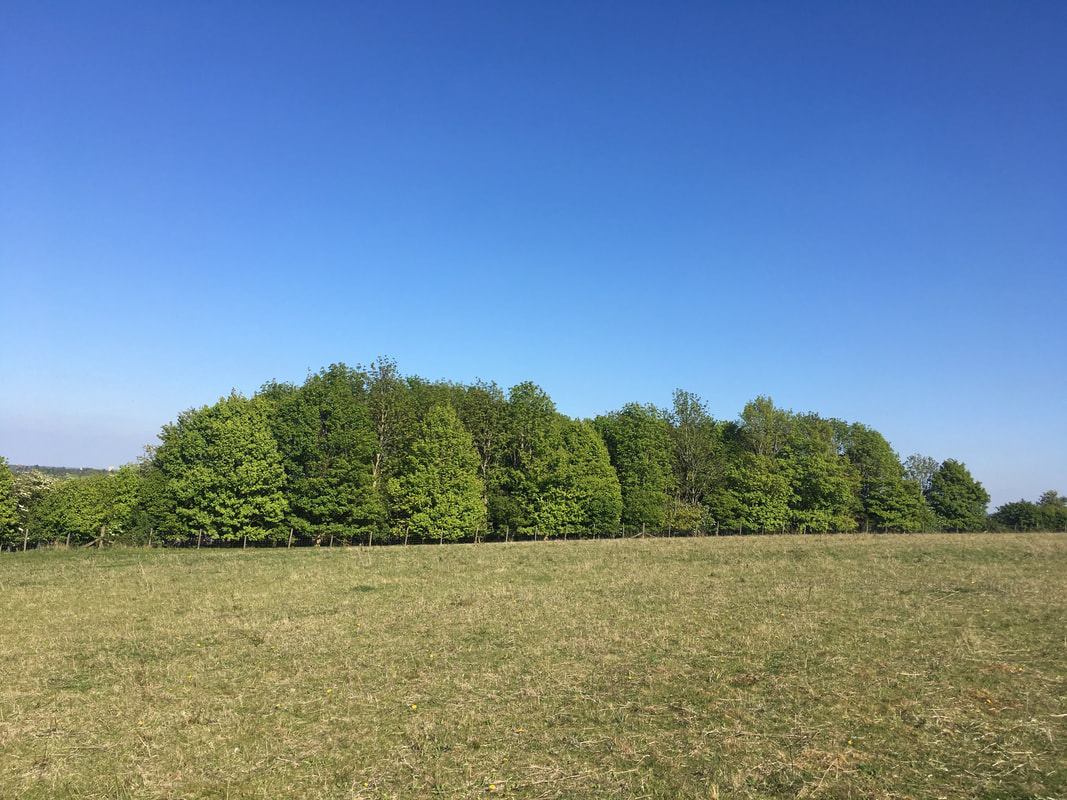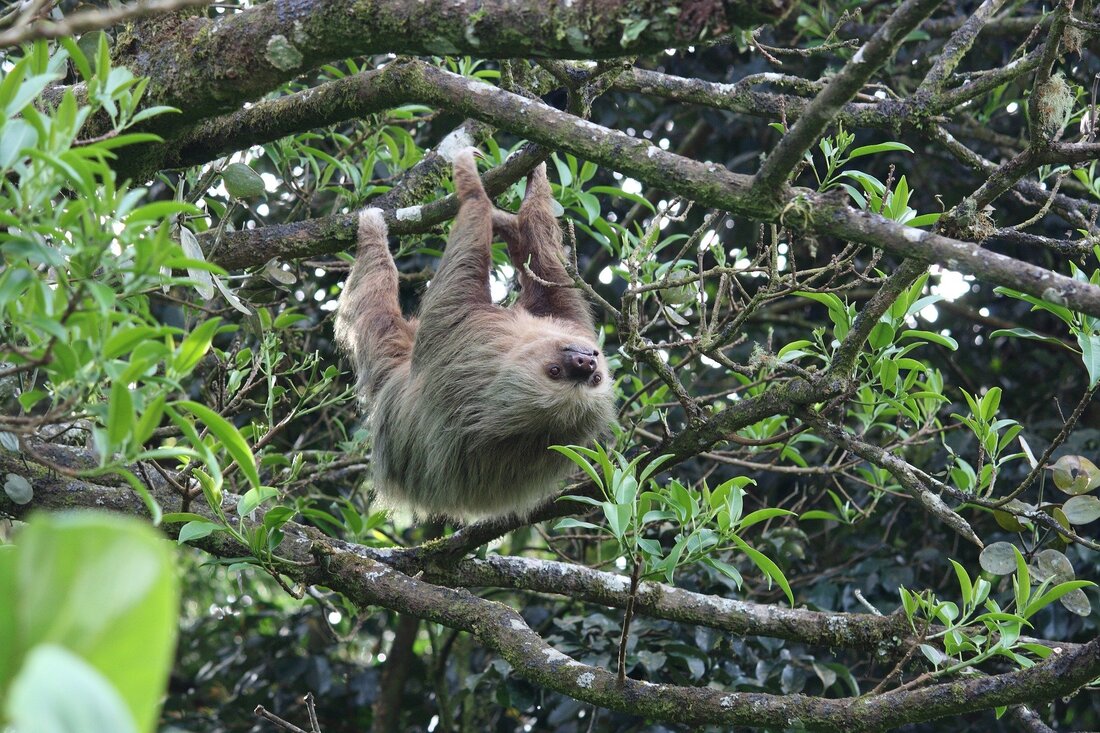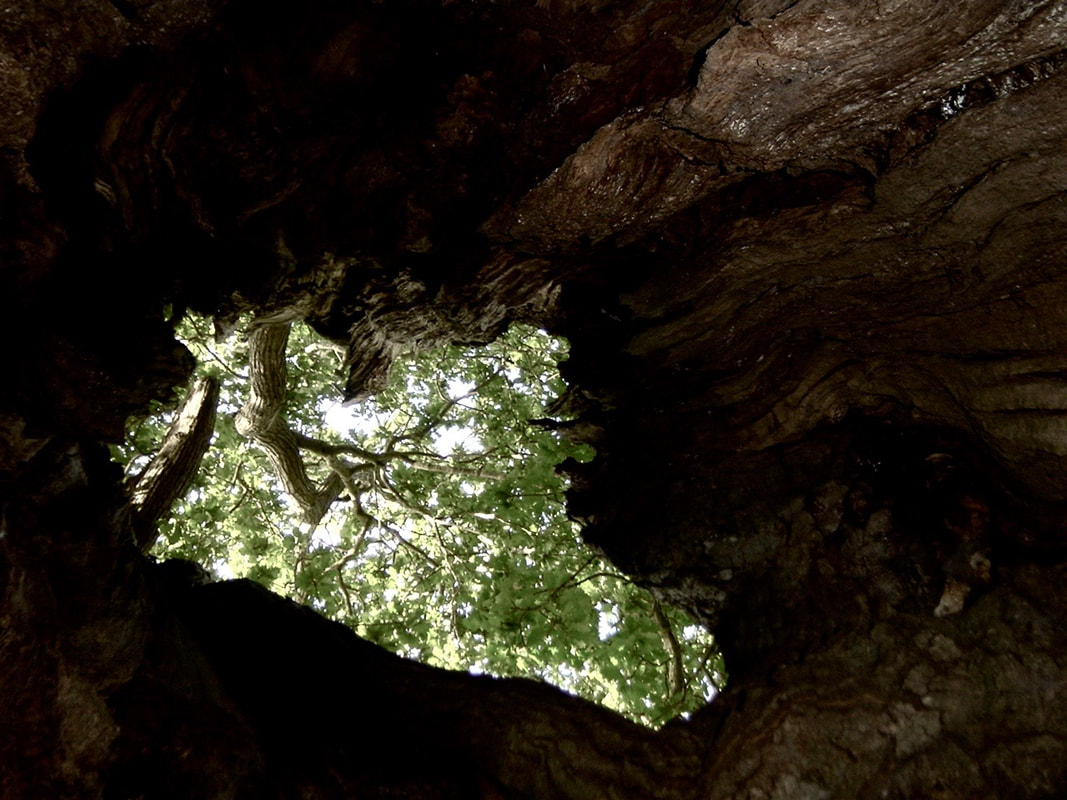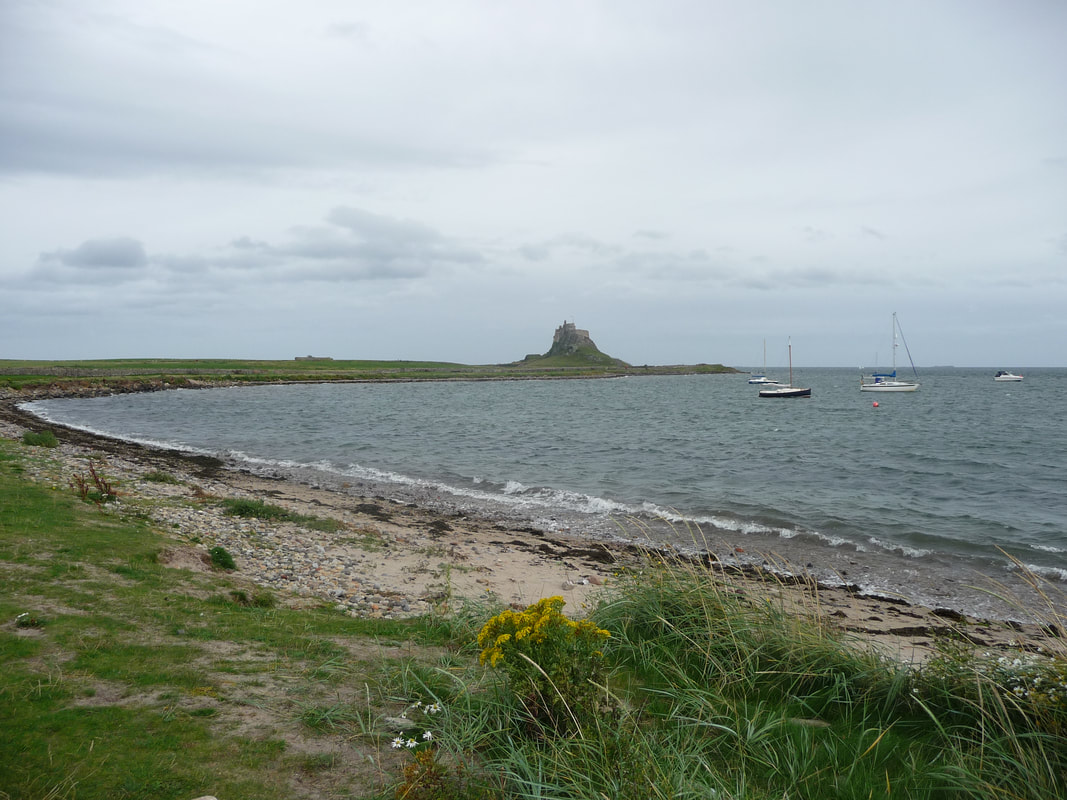|
Zoom Meeting “Ok, folks, let’s make a start.” Sue’s on the moon. That looks quite smart. “Oh wait, are we expecting Rex?” “I’ll reinvite. Can someone text?” Mike’s speaking but his sound’s gone dead. Is Sally in her garden shed? He’s unaware. The chorus swells, “Unmute! Unmute!” We wave and yell. He forges on as through a fog. Is that hairy thing a dog? “Test your mic, Mike! Test your sound!” “heLLO?” Relief and thumbs all round. The host continues, “As you know …” Then seizes in an awkward pose. Crikey, look at Nigel’s hair. He sputters in and out. “Oh dear…” “The internet’s quite dodgy here … I’ll **~~**~~ laptop **~~** upstairs.” Rooms swirl round. I feel quite sick. “OK, let’s see if that’ll stick.” Now Jen and Jules begin together. Zoom’s confused. It’s not that clever. So who was in that empty room? Both retreat. Then both resume. They urge each other, “Be my guest.” Jules concedes but then forgets Whatever point she meant to make. Those curtains were a bad mistake. “Sorry folks, I’ve got to leave. Another meeting booked for three.” Steve is having forty winks. He’s gone. Another broken link. “Thanks everyone. It’s been productive!” Certainly, it was instructive. “See you next time.” Meeting’s End. So good we’re able to attend. To hear the poem, click the play button. Reflections from a home front: 10 I thought I’d start with the poem for a change. In a week where I’ve felt less buoyant than previously, I have indulged in playing with some lighter stuff. [1] If you’d like a more thoughtful poetic take, try Malcolm Guite’s second Quarantine Quatrain. Zoom for two. Plus incidental Bookcase Credibility grab.[2]My own experience of Zoom – which includes work meetings, study groups, family chats and virtual drinks with the choir – is that of a mixed blessing. The moment when a familiar face enters the screen, there’s a little hit of pleasureable recognition. A few more people arrive, and – hurrah! – we’re together again. In spite of everything, here we all are! But here is an illusion, and it’s a less than convincing one in so many ways.
Although one-to-one works, after a fashion, group gatherings leave me feeling unsettled. I feel self-conscious and find it hard to know when to speak. And when I eventually do, it doesn’t feel as if I’m talking to anyone. This renders me less fluent and feeling a bit stranded. I know it’s suggested you turn your camera off, but seeing the group without me in it feels as if I’ve absented myself from proceedings, which makes me feel even more on the edge than I already do. There’s some consolation in knowing not all of this just me. For all of us, video calls eliminate so many of the subtle but vital cues to successful human communication that we pick up brilliantly, intuitively and mostly subconsciously. And this problem is exacerbated by multiscreen screens. It’s a significant challenge to the poor old brain; no wonder we’re left with Zoom Fatigue. (Now officially a thing.) For analysis of Zoom’s fascinating but complicated effects (for certain people it’s actually a better way to communicate) see these articles from National Geographic and the BBC. Even more unsettling than the neurological challenge is the emotional charge. When forgathering is forbidden, these facsimiles simply remind us of the living, breathing presence we do not have. It reminds me of a time when my daughter was about seven and I went away on a work trip to America. She completely refused to speak to me on the phone, knowing instinctively that it would be more than she could bear. Look, don’t touch. Hear, don’t hug. The experience is shot through with ambivalence. Well, it’s better than the alternative nothing. That’s the obvious argument. But if there’s one thing that the current situation has brought home is that for many things, there isn’t always straightforward way to determine what’s better or best, to put the short term alongside the long term, to put one kind of benefit above another. It seems likely that Zoom’s face replacement service will have a place in the emerging post-lockdown world. But if nothing else, we will surely value the simple act of being together, real people in real places – something so ordinary but so vital to human flourishing. [1]The Wandering Albatross said I should note that this more the result of pollen fever than cabin fever. [2] An absolutely brilliant thing on Twitter. Suspect mine would not come out well, though.
0 Comments
Reflections from a home front: 9 Five weeks in and we’re getting restless. After the initial adjustment phase, where we worked out how to live our newly constrained lives, thoughts are now turning to the even more difficult question of what happens next. As well as thinking about very practical problems of how to lift restrictions to avoid a Coronaresurgence, we are facing the fact that the world we return to will not be the world we just left. We may not have been asleep for 100 years, but so fast and far-reaching will be the changes that it could certainly feel like coming out of hibernation. We might well feel apprehensive. What will we find outside when we open the door? But if the material and economic world has been turned upside down, so have we. Collectively, we have been confronted with some uncomfortable realities: the illusory nature of our control, our vulnerability, the overwhelming complexity that underlies some moral choices, our sheer mortality. For us as individuals, acutely aware of all this, confinement has given us the opportunity to reflect on the status quo, and on ourselves. People emerging from serious and perhaps life-threatening illness often seem to do so with a very different outlook on the world. Some also acquire a new zest for living and a strong sense of purpose that provides the necessary impetus to make lasting changes. It’s a paradoxical experience: you wouldn’t want to go through it again or indeed wish it on anyone else, and yet you wouldn’t want to go back to being the person you were before. Under the current threat to life and restriction of activity, we seem to be experiencing something similar: increased appreciation of small pleasures, expanded compassion, greater clarity about what really matters, shifted priorities. It may feel as if we have been restored to something lost, returned to sanity, reclothed in our rightful mind. We couldn’t see the wood for the trees; now we see the whole of the wood, and each individual tree. It’s a completely transformed perspective of a sort that we can’t bring about through our own intellectual effort, however much we might desire it. It can only be received as a gift. There are immense questions about how we deal practically with the new world that we eventually shuffle into. But the still bigger question is not about how we regain what we have lost, but how we can hold on to the gift we have been given. How do we avoid wasting this once-in-several lifetimes chastening of an entire population? How do we hold our course? How do we build according to what we have learned? Today’s poem began with that phrase, “can’t see the wood for the trees”, which popped into my mind during a walk and seemed worth a poetic exploration. “Oh, you’re in a Wordsworthian phase,” said the Wandering Albatross. That wasn’t intentional; it’s just how it came out. You can hear how it came out by clicking the play button. Couldn’t see the wood for the trees
In what was left of evening light, Across the empty fields we glimpsed A grubby sprawl – the tangled twigs A hundred trunks and branching limbs And things that flapped and things that crawled, And no way through. We did not see The wood, nor any tree. But in the morning air, we saw A copse that traced the chalky slope – Each tree in rightful place: the beech And hazel rooting for the ash, The grazing snail and spying thrush, And ancient paths that call our feet Through woods and trees. That fading day, we knew our days Were numbered and no longer Where we lived – the constant flicking Seconds on display, and ticking Boxes, and the things that ping And measure up. We could not tell The time, nor break the spell. But in this strange dawn light, we sense A different stroke – a time to weep A time to plant, a time to keep The turns of earth and tidal ebb And spirit’s flow. It’s time to feel The pulse that urges us to dwell Under this time’s spell. Reflections from a home front: 8 Our reaction to the lockdown, as briefly observed last time, might depend on whether we are meerkats or sloths at heart. For one effect of living in this unfamiliar and uncertain territory is the way it tends to bring personal character traits to the surface. Sociability is just one dimension, though. There’s also our adaptability, our ability to cope with crisis or uncertainty, our reaction to being told what to do – or to no longer being told what to do. Not only do the strictures reveal our traits, they seem also to intensify them. To continue with the bestiary, whilst I’m really quite a happy puffin, pottering about the burrow and making occasional forays along the local coastline, I am, it turns out, sharing my space with a wandering albatross that’s flapping about with increasing agitation. Character traits also play out against the particulars of our situation. (With the prevailing conditions again tending to push things to the extremes; work is all or nothing, we are with family 24/7 or never. ) So, for example, and to return to the social aspect, a sloth in glorious isolation will hang happy, but a sloth forced to share the branch with other sloths, or – worse – a family of displaced and discombobulated meerkats – might be pretty stressed. With these amplified differences in character and situation, it could feel as if our social distance is becoming a psychological one. But, at the same time and with equal efficiency, the situation reveals our common humanity in all its interconnectedness. BC, it was sort of possible to carry on under the illusion that we could pursue our own individual path, doing our own thing in our own time. Now, it couldn’t be clearer: we’re all in it together. The truth is that we were always in it together. However much we may feel like different species at times, we’re all on the same planet. I have to admit that my poem today isn’t a new one. (Well that’s a slippery slope, said the Wandering Albatross.) I’ve got a new one started but it hasn’t quite fallen into place yet. However, I’ve been tidying my old poem collection and, in the course of rounding them up from various corners of the computer into one neat folder, I found this one. It was written for quite another sort of occasion, but, there’s something there about difference which seems to resonate. So I thought I’d dust it off and give it an airing while the other one sorts itself out. And here end the animal analogies. For now, at least. You are to me …
so often an owl – an elegant soul, sharp eyed, night flyer – to wit, a hoot. And sometimes a sanglier* – certainly singular, a secretive creature from deep in the forest – no hiding those tusks. But also a puffin – summertime clown, dapper flapper, tide catcher, on the edge, in the moment. A sea otter’s you, too, happy afloat, at home on the deep, and in sleep, holding hands, so we don’t drift off. Would I weren’t a hedgehog – hugging the ground, a pricklish kind, too easily flattened, but on clear nights now, looking up at an owl. * Wild boar, Cingularis porcus Reflections from a home front: 7 It’s the worst of times. But also, in some corners, the best of times. Bad news for the elderly, the economy and those still in formal education; good news for Amazon and – for that matter, maybe – The Amazon. It depends, of course, on who you are and where you are and also perhaps on what you are. How you feel about being in isolation, for example, might depend on what kind of animal you happen to be. Meerkats are scrabbling at the walls; sloths are hanging cool and couldn’t be happier. Some of those having a better time seem to find it a tricky admission. For few enjoying quiet pleasure wouldn’t feel a twinge of guilt when the world is in pain. It’s partly social conditioning. It looks inappropriate to be enjoying ourselves when others aren’t. We can also shift the blame, at least partially, onto our poor old brain. In its drive for efficiency, it prefers to file things in neat and tidy categories. A this or a that; a good thing or a bad thing. But only partially. We do of course have the ability to move beyond facile judgment, to hold uncertainty and to stay with conflicting, layered emotions. But it’s a kind of wisdom and we have mature into it. We have to learn to accommodate and appreciate nuance, complexity, ambiguity and paradox – and to navigate amongst them. As so many have observed, these things have been disappearing from a public discourse that tends to black-and-white binaries – as evidenced by the whole sorry Brexit affair. But perhaps now, in this very different kind of crisis, it may be easier to see the texture of a bigger picture. Perhaps, as we enact the tensions of the situation within our own lives – mourning a friend’s death even as we clap for the NHS – we’re apprehending more of our entangled reality. Perhaps the distance we now feel, from each other and from normal life, might afford the kind of perspective we need to reset our course. Perhaps, from the distance of years to come, we could be celebrating the legacy of the best. Of course any kind of final balance is a long way off – as if these things could be put in the scales anyway. But the eventual reading will be up to us. Sound effects
The world’s invaded by some viral strain. Contagious care can never be contained. So long the queues; so scarce delivery slots. We bake our daily bread, we tend our plots. School’s out; we’re on indefinite staycation. We’re in for an exclusive education. Performances are pulled from every stage. Play spills across the screen and down the page. No trips are now advised; all flights have ceased. Just bird song carries on the sweetened breeze. Two metres’ rule has pushed us all apart. We pull the strings that stretch between our hearts. Within the pupal shroud all things dissolve And secretly refold, and in the spring – Behold, the blaze of unsuspected wings! Reflections from a home front: 6 Several times a day, we hear phrases such as ‘In these extraordinary days’ or ’In these strange times’. Already they are sounding a bit tired, but what else to say? Then there’s the ubiquitous ’Keep safe’ and other duck-billed platitudes. But you do have to say something. We are at the point where language runs out on us. But from the distance of the screen, we don’t have a lot else. You cannot Zoom a hug; words are all we have. Though, somehow, miraculously, even our bumbling clichés become freighted with recognition of our shared experience and understanding. Nevertheless, also we need our words to do more. In other words, we need poetry – and we need stories and images and song. Even at a time when attention is on practical action and sacrificial altruism, we need art. Human beings in extremis have always turned to creative expression through words, notes and marks. And some of the art we need speaks directly of, or out of, the present strictures and suffering – a crucial complement to the multiplying reports and analysis. But it doesn’t have to. Truth about the human condition is really all we need. We need it, not only as respite from uncomfortable reality, or as a window onto the wider, forbidden world, or simply to make us smile – vital though all those things must be. More urgently, we need it to articulate our feeling in all its complexity, and to tease out meaning. We need it to seed our imaginations so we see how things could be different. We need it to imagine that the world already is different from that constructed by our easy assumptions. Ultimately, art lifts our eyes and enables us to see our present circumstances, and ourselves, within a bigger picture, a meta-narrative. That may be a faith story or it may be something else. This week happens to be the week that two major faiths remember and celebrate the stories at their heart – both of which happen to be stories of suffering and death. On the other side of which, is life. Today’s poem might be a Good Friday poem, or it might be a response to the current situation, or it may be something else. It just arrived, and I wouldn’t want to be too prescriptive about it. You can hear me read it by clicking on the play button. De Profundis
On Friday, as I walked apace, Taking in the scenery, The ground my foot found Flew away, The world spun round And I went down, Traffic, hedges, road – all gone. Holes in roads are commonplace And mostly fenced, with signs and cones. Not always, though. And now below, Much deeper than you would believe, I breathe the dark and wait alone. Wires of ancient roots intrude, Through earthen walls. And then I glimpse The splintered bones and glassy flints And seasoned seeds in ribboned strips – The secret treasures of the deep. The stippled strata, neatly pressed Are ripples of arrested time. My months and minutes read the same: Measure makes no meaning here Where rhythms cease to tune the mind. Mingled voices, feet and birdsong Strain from somewhere out of sight Above the shining mouth. And like A single sapling, soft and slow, I’ll grow towards the light. Reflections from a home front: 5 In a new BBC public information film, Steve Coogan’s alter ego, Alan Partridge, has been drafted in to urge us to ‘Set a routine to get through staying in’. An unlikely bit of wartime propaganda. Certainly not as galvanizing as ‘Dig for Victory’ or ‘Careless Talk Costs Lives’, Although, thinking about it, we could perhaps do some useful recycling here. I propose, to encourage online shopping: ‘Click for Victory’. And one for this sunny weekend: ‘Careless walks cost lives’. But the Partridge point is well made. If we’re leading monkish lives, then it might make sense to impose some kind of order. Of course, at a purely practical level, a strict routine just helps you get more done. I think nostalgically of the school timetable. There was something hugely liberating about it – the dread of Wednesdays with Games and double German notwithstanding. No hour-to-hour or minute-to-minute decisions about what best to do next. No exceptions allowed. All you have to do is show up, day in day out, and stick with the programme. How on earth did we manage to do all those O levels in parallel? I’m sure I’d struggle to do even one now. But beyond simply ‘getting though’ and mere productivity, there is something very useful in the monastic idea of the Rule of Life. It originated with the Desert Fathers, a community of mystics in Egypt around the third century AD. Then in 516 it was formalised in The Rule of St Benedict, created to bring some structure to the messiness of a busy communal life with all its domestic demands, and for that to be reflected in the inner life. Superficially, a Rule of Life may not sound very attractive. The association of ‘rules’ with things like conformity, rigidity and submission to authority is unfortunate. Because a Rule of Life is not imposed from outside but from within.[1] It’s crafted and honed by each individual, a work of art in itself. If the outer structure is right, it holds and nurtures the inner life – the life of spirituality, intellect and creativity. As Alex Poon has documented, the trope of the freewheeling creative is a myth. A survey of creative and intellectual high achievers reveals an almost universal adherence to routine.[2] Creativity needs boundaries. Framework creates freedom. Few put it better than the poet, Mary Oliver: What some might call the restrictions of the daily office they find to be an opportunity to foster the inner life. The hours are appointed and named… Life’s fretfulness is transcended. The different and the novel are sweet, but regularity and repetition are also teachers… And if you have no ceremony, no habits, which may be opulent or may be simple but are exact and rigorous and familiar, how can you reach toward the actuality of faith, or even a moral life, except vaguely? The patterns of our lives reveal us. Our habits measure us. Our battles with our habits speak of dreams yet to become real. Moreover, we are are intrinsically rhythmic creatures. Subconsciously, we entrain to rhythms at every level: the ebb and flow of the seasons; the daily cycle of light and dark that resets our body clocks; the pulse of music, the beat of another heart. We flourish when our lives are so measured. One unexpected benefit of this time has been that I’ve been able to reclaim something of life’s natural rhythm as well as trying out new daily routines. The eerily blank diary has helped, of course. With a clear week of evenings, we’ve allocated each one to different activity. Thus, for example, Wednesdays are for learning a skill. The husband is polishing his Spanish, and I’m planning to teach myself Latin, for which there was regrettably no room in that school timetable. (Lest we sound like a couple of swats, Fridays is for Netflix.) So to today’s not entirely serious (though not entirely frivolous) poem. Just for fun, each stanza contains at least one quotation or an allusion to a line from Shakespeare. So, if you have a space in your schedule, you can see if you can name all the plays (fewer plays than stanzas). Bonus marks for the characters. Corona Times
It’s Monday, and a brave new world . We have a plan; we’ll make it work. First, Pilates, for a boost, Learn Italian, start on Proust. On Tuesday, we return once more Unto the breach, and take a tour Of three museums, make some bread, Organise the garden shed. On Wednesday we detect a sound So rich and strange. We hunt around – Not smoke alarm, nor mobile tone … Aha! It is the telephone. Friday creeps at petty pace. The walls press in; we press escape, Then spend a happy afternoon Zoomed into next door’s living room. Oh now it’s Friday. Now we see Time’s out of joint, and so are we. Caught in this life’s revolving door, We stiffen our resolve once more. No-end weekend, daily Sabbath – Method will o’ercome the madness. When Monday comes, we will divine The syllables of common time. Notes [1] Esther de Waal, writing abut monastic spirituality, observes that regula, a feminine noun, carries ‘gentle connotations: a signpost, a railing, something that gives me support’. From The Way of Simplicity. [2] From Darwin to Dickens, these high achievers from a wide range of fields have characteristically disciplined routines that allow not only for work but also for ample leisure. Alex Soojung-Kim Pang, Rest. |
AuthorStill me … Archives
September 2020
Categories
All
|
